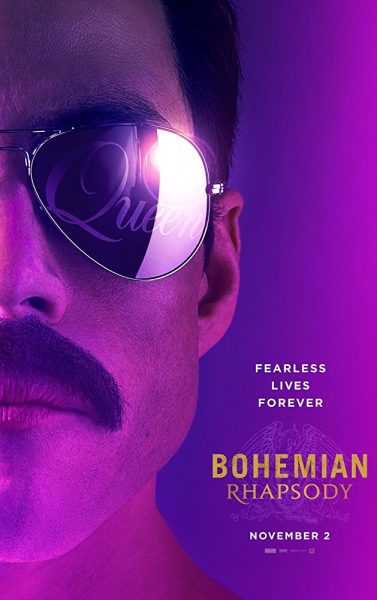
No matter what, Bohemian Rhapsody is the musical biopic about the iconic rock band Queen and their legendary frontman Freddie Mercury that the surviving members wanted to make. Following reported creative differences and Back Chat between Sacha Baron Cohen and members Brian May and Roger Taylor, Queen instead opted for a screenplay from Anthony McCarten and Bryan Singer as director. The fruits of their labor give us a scattered timeline of the band’s rise to superstardom, and the strength of Rami Malek’s performance as Mercury keeps all of the events compelling- even when the story starts to periodically feel a little routine.
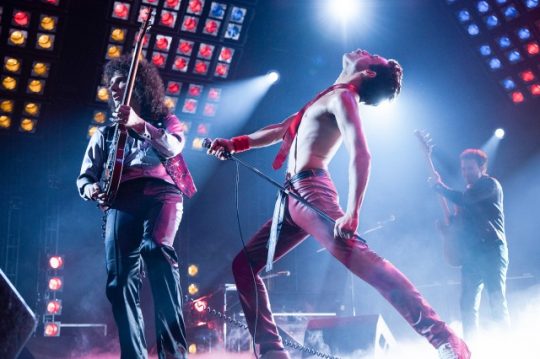
Mercury’s range and level of charisma were unheard of in arena rock of that time. He strutted around the stage with flamboyant bravado and swagger, throwing out vocal heroics that were as infectious as they were powerful, and his ear for melody served as a great compliment to the talents of guitarist Brian May (Gwilym Lee), drummer Roger Taylor (Ben Hardy) and John Deacon (Joseph Mazzello), who joins alongside a young Freddie (Adam Rauf) who replaces vocalist Tim Staffell May and Taylor’s band Smile.
Taking some fashion advice from his girlfriend Mary Austin (Lucy Boynton), Freddie makes noise both with his voice and Body Language in his first night singing “Keep Yourself Alive”, and the newly christened Queen’s chemistry onstage has the London rock scene abuzz.
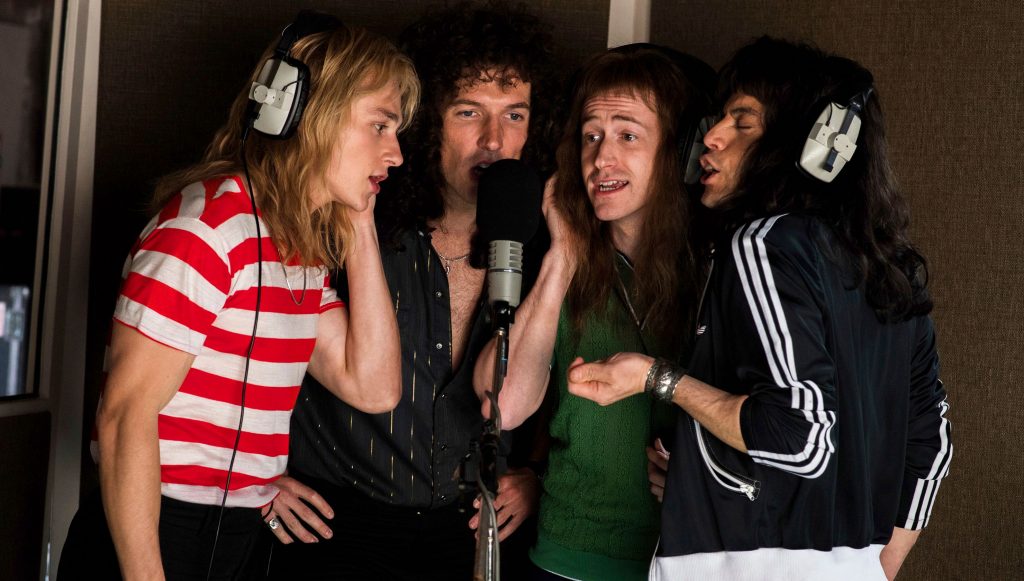
Alongside their new cocky frontman, the band refuses to compromise their One Vision to appease EMI label heads. Mike Myers has a funny and convincing performance as a music executive who doesn’t feel that the movie’s title song will have any Staying Power with radio, on account of its six-plus minute length.
Undaunted, Queen spends hours and sleepless nights re-recording multiple takes of Bohemian Rhapsody’s operatic sequences (much to Roger Taylor’s annoyance), and despite an on-screen display of harsh reviews, it sends them rocketing up the charts with a Flash in America and stadiums across the world.
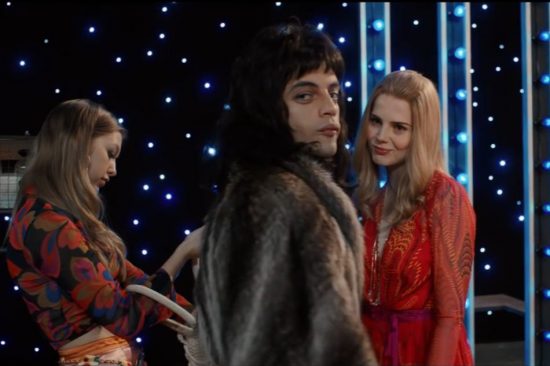
All the while, Freddie grows more connected with his personal manager Paul Prenter (Allen Leech), an Irish DJ who becomes his Good Old Fashioned Lover Boy, and then woos Fred into considering a solo career. Unfortunately, this is where movie has a few issues with how it presents Freddie’s sexual awakening, which has been the source of heavy controversy before the film’s release.
There’s a large chunk of screen time devoted to Mary Austin’s frustration over Freddie’s inability to commit to a steady relationship because of his bisexuality and constant touring, while Freddie tries to have his cake and eat it too by moving next door to Mary even after they’ve broken up. When she won’t come over for a drink, he buries his loneliness in an outrageous wine-filled party. Even though Friends Will Be Friends, the bandmates are still concerned over his developing prima-donna attitude.
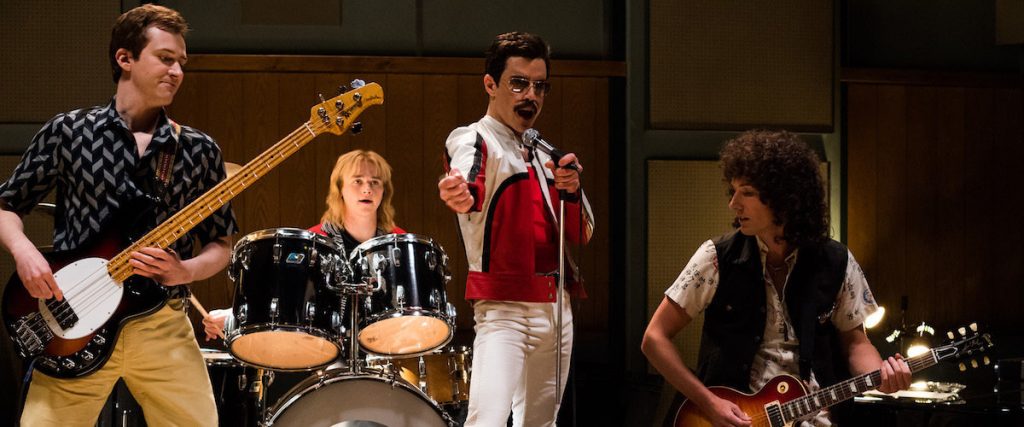
Though the movie doesn’t eliminate Freddie’s queerness, there’s at times an undercurrent of dread, more of a Scandal-aspect to Freddie’s gay nightlife running through the movie- and how the News Of The World over his private affairs (notably during their promotion for Queen’s disco-inspired Hot Space) affects him personally. It feels more focused on Fred falling into a “bad crowd”, Paul Prenter’s poor management of Fred’s career, and their falling out than what’s basically his search for the truth about himself.
As the band themselves are essentially driving the narrative, his love life is certainly going to be from their outside perspective. Luckily, the movie is more willing to accept Freddie as a blossoming gay icon by the end. But for most of the runtime, it’s a bit of a letdown for someone of that stature to have their sexuality tied so heavily to the “lead singer gets a big head and grows distant from his bandmates” cliché.
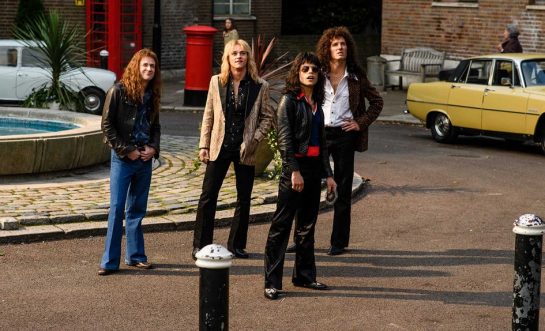
What really buoys this film are the effectiveness of its performances and the concert sequences. Thanks to Newton Thomas Sigel’s cinematography, their legendary 1985 Live Aid performance at a re-created Wembley Stadium is jaw-droppingly impressive. Malek (aided by some voice modification in post-production) is electric throughout the twenty-minute showcase, and in fact he has A Kind Of Magic in all of his numbers.
His Mercury is dryly witty, extravagant and genuinely sweet, but also incapable of being by himself for very long. He’s a creature who sustains himself on the adoration and attention of others (which of course, makes him a more natural performer onstage. Much of the supporting cast and performances from the actors playing the band are solid enough as well, especially Gwilym Lee who captures Brian May’s natural affability.
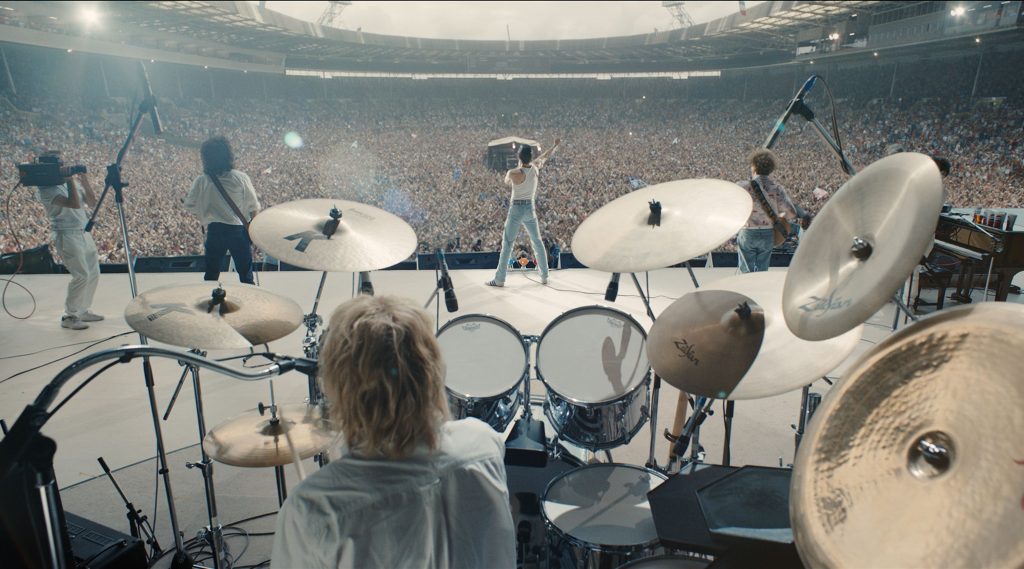
So Bohemian Rhapsody doesn’t quite Bite The Dust, but it’s also not a totally perfect biopic, as it leaves too much on the cutting room floor and features a lot of historical inaccuracies. It won’t make you feel like you’re Going Slightly Mad, but here probably could have been more attention on Mercury coming to terms with his HIV diagnosis, though I can understand why the producers would want to steer towards a more uplifting tone overall. Personally, I’d have liked to have seen how the rising punk movement impacted Queen’s public perception in the mid-70’s music scene (maybe with a depiction of Freddie famously calling Sid Vicious “Mr. Ferocious”.)
But it mostly succeeds when it comes to Rami Malek’s performance of capturing some of Mercury’s legendary charisma, especially from an artistic standpoint. With a stronger script that didn’t rely on so many rock-doc tropes that heavily, it could have been an incredible film. For what it is, it’s a decent celebration of Queen’s catalog that probably could have gone further at periods, but it’s got enough warmth and great music for me to recommend it. If you’d had the opportunity to Bicycle Race to a theater and see it, let us know your opinion at @Official_FAN on Twitter!
